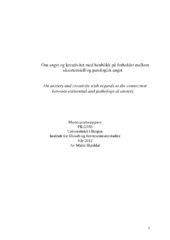Om angst og kreativitet med henblikk på forholdet mellom eksistensiell og patologisk angst
Master thesis
Permanent lenke
https://hdl.handle.net/1956/5896Utgivelsesdato
2012-02-01Metadata
Vis full innførselSamlinger
- Department of Philosophy [240]
Sammendrag
Kierkegaard was the first to dedicate a book to the philosophical study of anxiety. The Danish thinker showed that mans anxiety is inseparable from his specifically human relation to himself and his world. Man exists; he stands out of nature and is conscious of himself. His existence produces an ambiguous anxiety that can be a destructive as well as a constructive force in human life. Many have been influenced by Kierkegaard’s complex analyses of the different ways in which man tries to deal with his existence. In various attempt to escape anxiety man limits his self-consciousness and creativity. It is not difficult to see the similarities between Kierkegaard’s descriptions of destructive conditions and certain clinical diagnoses. In psychiatry and psychology there is a tendency to focus on pathological anxiety at the expense of the existential anxiety that precedes the development of destructive conditions. Here I will attempt to examine the concepts of existential and pathological anxiety further. I will attempt investigate the connection between existential anxiety and mans creativity, the dynamics that underlie the development of pathological anxiety, and the effect of pathological conditions on mans creativity. Kierkegaard’s thinking moves across the boundary lines between psychology, philosophy and religion. So do the writers who are inspired by him. Through our attempted investigation we will get acquainted with the psychologist Rollo May, the anthropologist Ernest Becker and the philosopher and theologist Paul Tillich. It will become apparent that we are also moving across different levels. We will inevitably touch upon philosophical questions such as those concerning the self, freedom, being, non-being, doubt, faith, health and illness. Oppgaven undersøker forbindelsen mellom eksistensiell angst og kreativitet, og hvordan ulike forsøk på å håndtere eksistensiell angst kan føre til patologiske tilstander som begrenser kreativiteten. Temaet blir belyst gjennom de tre Kierkegaard-inspirerte forfatterne Rollo May, Ernest Becker og Paul Tillich.
